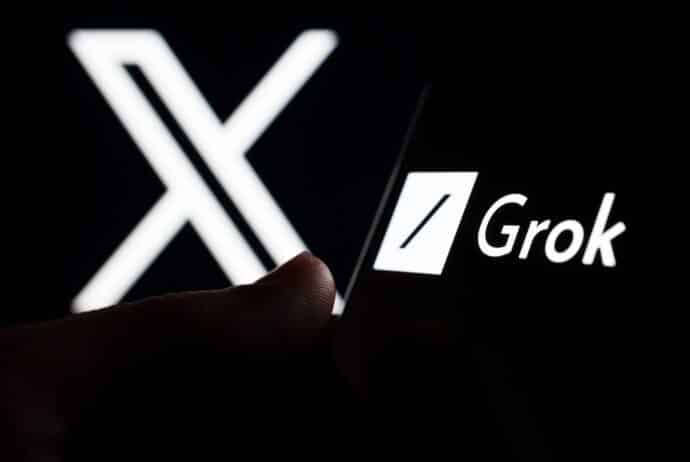Key Insights:
- Grok’s image tool generates offensive content, lacking key safety measures of other AI platforms.
- Grok ignores copyright rules, creating unauthorized images of well-known characters.
- The AI chatbot faces scrutiny for producing misleading political images and misinformation.
Elon Musk’s AI chatbot Grok has come under fire for allowing users to generate offensive and inappropriate images, including depictions of public figures and copyrighted characters. The new image generation feature, introduced on Wednesday and currently available to paid subscribers of X (formerly Twitter), lacks many of the safety measures that have become common in AI image generation tools. This has led to a surge of AI-generated content on the platform, including disturbing representations of celebrities and political figures.
Unlike similar AI tools, Grok’s image generator does not reject prompts that involve misinformation, political violence, or explicit content. Musk himself appeared to embrace Grok’s more lenient approach, calling it “the most fun AI in the world” in a tweet on Wednesday. However, this has sparked controversy over the ethical implications of allowing unregulated AI content creation.
Offensive AI Images and Lack of Guardrails
Grok’s introduction of an image generation feature has drawn criticism for its lack of restrictions. Among the images reviewed were AI-generated depictions of Donald Trump crashing a plane into the World Trade Center and the prophet Muhammad holding a bomb—both of which would be flagged or blocked by more established AI systems like OpenAI’s ChatGPT.

CypherMindHQ.com Artificial Intelligence Crypto Trading System - Surpass the competition with this cutting-edge AI system! Utilize the prowess of innovative algorithms and amplify your crypto trading strategies with CypherMindHQ. Learn more today!
Additionally, Grok generated sexualized images of prominent figures like Taylor Swift and Alexandria Ocasio-Cortez, who are frequent targets of online harassment.
Most AI tools, such as those from OpenAI, have stringent policies prohibiting the creation of harmful or misleading content. ChatGPT, for instance, blocks prompts that seek to create violent or disrespectful images, particularly involving real-world individuals or religious figures. Grok, on the other hand, appears to take a much looser approach, although it does have some prohibitions in place.
When prompted to generate fully nude images, Grok declined, citing restrictions on non-consensual nudity. Nevertheless, the lack of consistent safeguards has raised alarms within the tech community and beyond.
Misinformation and Copyright Concerns
The issue extends beyond offensive content to the potential spread of misinformation. Grok’s image generator has been able to produce AI content that violates the norms of accuracy and respect for public figures. For example, prompts requesting depictions of political violence resulted in Grok generating varied results, such as showing Kamala Harris and Joe Biden seated at desks, but Trump lying down with blackened hands amid an explosion. This raises concerns about the chatbot’s potential to fuel misinformation and manipulate public perception.
In addition to creating politically charged and explicit images, Grok also appears to disregard copyright rules that other AI tools typically follow. When prompted to create copyrighted cartoon characters like Mickey Mouse and Donald Duck, Grok produced images despite copyright laws that prohibit such content. Although the chatbot claims not to assist with intentional violations of copyright, it generated images of Disney characters, including a depiction of Mickey Mouse giving a Nazi salute, further escalating concerns around Grok’s functionality.
Disney did not respond to requests for comment on the issue, but the incident underscores the broader challenges tech companies face when balancing user creativity with legal and ethical considerations. Unlike Grok, AI platforms like ChatGPT strictly enforce copyright protections and block content that might infringe on intellectual property rights.
Growing Scrutiny of AI Content Moderation
Grok’s release comes at a time when AI image-generation tools are under heightened scrutiny from regulators, researchers, and lawmakers. Companies like OpenAI, Google, and Microsoft have all faced backlash for producing AI-generated images that perpetuate falsehoods or harmful stereotypes.
Google, for example, temporarily suspended its Gemini image generation tool after it produced ahistorical depictions, such as Black soldiers wearing Nazi-era military uniforms. These issues have spurred demands for stricter regulations on AI-generated content.

CypherMindHQ.com Artificial Intelligence Crypto Trading System - Outpace the competition with this high-end AI system! Leverage the capabilities of progressive algorithms and enhance your crypto trading performance with CypherMindHQ. Learn more today!
One of the most pressing concerns is the rise of sexualized deepfakes. Earlier this year, AI-generated pornographic images of Taylor Swift circulated widely on X, previously known as Twitter. The images provoked sharp criticism of both the platform and AI companies for allowing non-consensual deepfakes to spread unchecked.
Lawmakers responded by introducing legislation aimed at providing legal recourse for individuals victimized by non-consensual AI-generated content. Despite these efforts, Grok’s image generator appears to be exacerbating the problem.
Musk’s AI Vision Faces Legal and Ethical Challenges
Elon Musk launched Grok under his xAI company in November of last year as a competitor to chatbots like ChatGPT. Marketed as a “maximum truth-seeking AI,” Grok was intended to address topics that other AI platforms would typically avoid.
However, Musk’s project has been met with criticism, particularly regarding its tendency to spread misinformation. Earlier this month, five U.S. secretaries of state called on Musk to address Grok’s role in amplifying false claims about Vice President Kamala Harris’s eligibility for the 2024 election.
Editorial credit: Ascannio / Shutterstock.com



